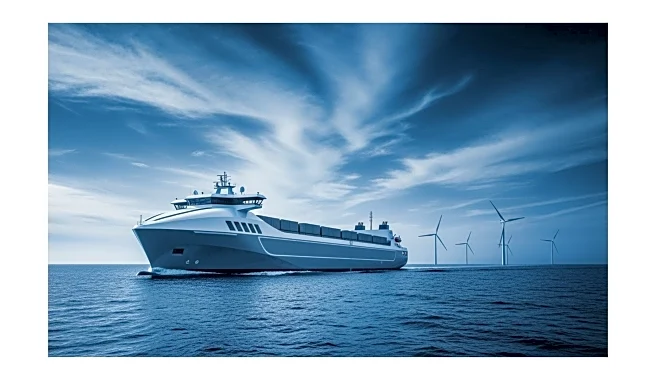What's Happening?
The Neoliner Origin, the world's first large commercial wind-propelled cargo ship, successfully completed its inaugural Atlantic crossing on October 24. The 6,300 dwt/13,278 gross ton vessel, which departed from Saint-Nazaire, France, on October 16, faced
significant challenges, including damage to its aft main sail mast due to powerful Atlantic storms. Despite these setbacks, the ship arrived at the French outpost of Saint Pierre and Miquelon, off the coast of Canada. The Neoliner Origin operates in a hybrid mode, utilizing both sails and an engine, and is designed to reduce emissions by up to 80% compared to traditional cargo ships. The vessel is scheduled to proceed to Baltimore, although its arrival has been delayed. The ship's journey marks a significant milestone in sustainable shipping, with the potential to transport refrigerated cargo such as fresh fruits and produce.
Why It's Important?
The successful crossing of the Neoliner Origin represents a significant advancement in sustainable maritime transport. By reducing emissions by up to 80%, the ship offers a promising alternative to conventional cargo vessels, aligning with global efforts to reduce carbon footprints in the shipping industry. This development could influence future ship designs and encourage investment in wind-propelled technology. The Neoliner's ability to carry refrigerated cargo also opens new opportunities for trade, particularly for remote regions like Saint Pierre and Miquelon, which could benefit from direct links to France. The ship's journey underscores the potential for innovation in reducing environmental impact while maintaining commercial viability.
What's Next?
Following its stop at Saint Pierre and Miquelon, the Neoliner Origin is set to continue to Baltimore, although its arrival has been postponed. A welcoming event in Baltimore has been rescheduled for the ship's second trip. The vessel's return to France will include a celebration in the French colony, highlighting the restored direct trade link. As the Neoliner Origin continues its operations, it will serve as a prototype for larger services, potentially expanding the use of wind-propelled technology in the shipping industry. The success of this venture could lead to increased adoption of similar technologies, furthering the push towards sustainable shipping solutions.
Beyond the Headlines
The Neoliner Origin's journey highlights the broader implications of integrating sustainable practices in the shipping industry. The ship's design and operation could set a precedent for future regulatory standards aimed at reducing emissions. Additionally, the vessel's ability to transport refrigerated goods efficiently may influence supply chain logistics, particularly for perishable items. This development also raises questions about the economic viability of such technologies and their scalability. As the industry observes the Neoliner's performance, it may prompt further research and development in alternative propulsion systems, potentially leading to a shift in maritime transport norms.














